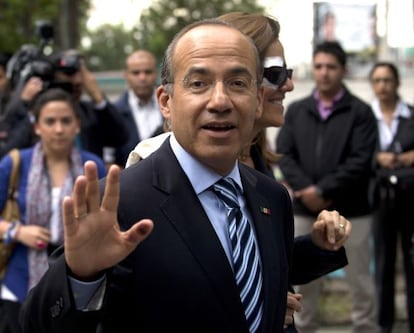"I don't fear being called before the Hague court; I acted within the law"
Mexican president Felipe Calderón defends his record in office, blaming the spiraling violence in the country on a cartel turf war

Mexico's President Felipe Calderón, who will leave office in December, doesn't seem upset that his National Action Party (PAN) lost the election to the Institutional Revolutionary Party (PRI) on July 1. It was the PAN that kicked the PRI out of office after 70 years in power when its candidate and Calderón's predecessor, Vicente Fox, won the presidency in 2000. Now the PRI will return with a new president, Enrique Peña Nieto, who promises a reformed leadership within the historic party. The 50-year-old Calderón says he is prepared to leave satisfied with his six years in office, convinced that the fight against drug traffickers he initiated as well as some of his reforms will continue.
Question. As an opponent of the PRI, how do you assess the party's return to power?
Answer. Beyond being an opponent, I am, first of all, a democrat, and it is democracy that dictates what needs to be done.
Q. There are some that say you made a pact with the PRI.
A. Oh gosh! There is no truth to that. My pact is with the law, the Constitution and democracy.
Q. Do you think that there should have been a bigger campaign debate about violence?
A. It would have been really useful if alternatives had been discussed, but none were presented. The candidates, in one way or another, supported the policies that we have put into practice. They said they would embark on new strategies, but when the time came to explain those changes, they repeated what has been done. My conclusion is that the three-fold strategy we have introduced - which is to battle crime, restructure law enforcement and judicial institutions and repair the social fabric - is the road that we must continue to take.
Q. In personal security, do you think Mexico is a safer place than it was six years ago?
A. If we are talking in terms of strengthening the institutions, I would say yes. In terms of violence, no, because evidently there has been a powerful surge in the number of deaths generated by criminal groups fighting each other for drug routes, not only in Mexico but across Latin America. This is not something that was ignited by the government action. I can assure you that I found institutions at the federal, state and municipal levels that were rotten to core. Today, the federal agencies, albeit with their defects and deficiencies, are much better. There has been a dramatic rise in violence since 2004, which reached a climax in 2011, but since then, it has been constantly decreasing. The number of violent murders in Mexico should drop by 15 to 20 percent between January and June compared to the same period last year. There is more violence now since before I came to office, but I insist it is because of the brutality and the rivalries between the drug cartels and not because of any government action.
Q. Some NGOs have denounced that serious human rights violations have been committed in this war against the cartels. Do you fear being called before the International Court of Justice at The Hague?
A. No because we have always acted within the scope of the law. There have been great numbers of murders in Mexico, which of course we regret, but the ones who committed these murders have been criminals. I believe that a government would have been irresponsible if it hadn't taken action. There could have been human rights violations on behalf of the armed forces and police, but these are isolated cases.
Q. Former President Vicente Fox has said that there have been human rights violations.
A. Well, if he has any knowledge of this, he must go to the proper authorities to report them.
Q. Who do you think lost the elections - the PAN party or the federal government?
A. As a PAN member, I say we all lost. PAN members who are in government lost because we were unable to muster enough votes to back our policies; the party leadership lost because the candidate-selection process was erratic and torturous, and had a political cost. The campaign strategy was based on change and difference and not on continuity, despite the government's 60-percent approval rating.
Q. Do you see yourself in another political position?
A. I haven't ruled it out. There are a lot of things I can do because I believe that the work we started during this administration must continue.
Tu suscripción se está usando en otro dispositivo
¿Quieres añadir otro usuario a tu suscripción?
Si continúas leyendo en este dispositivo, no se podrá leer en el otro.
FlechaTu suscripción se está usando en otro dispositivo y solo puedes acceder a EL PAÍS desde un dispositivo a la vez.
Si quieres compartir tu cuenta, cambia tu suscripción a la modalidad Premium, así podrás añadir otro usuario. Cada uno accederá con su propia cuenta de email, lo que os permitirá personalizar vuestra experiencia en EL PAÍS.
¿Tienes una suscripción de empresa? Accede aquí para contratar más cuentas.
En el caso de no saber quién está usando tu cuenta, te recomendamos cambiar tu contraseña aquí.
Si decides continuar compartiendo tu cuenta, este mensaje se mostrará en tu dispositivo y en el de la otra persona que está usando tu cuenta de forma indefinida, afectando a tu experiencia de lectura. Puedes consultar aquí los términos y condiciones de la suscripción digital.








































